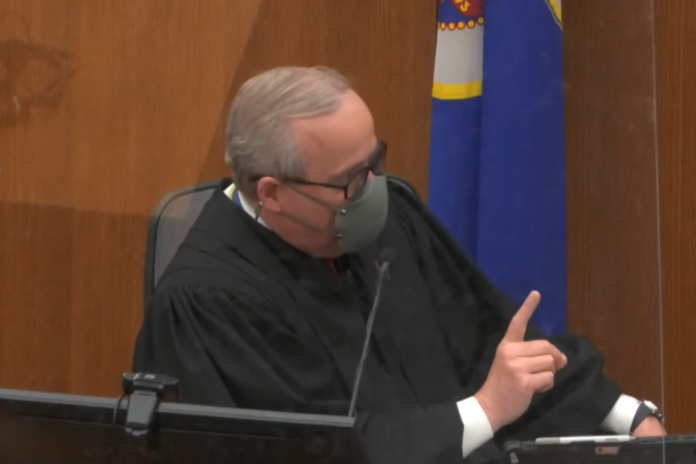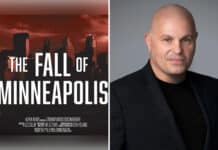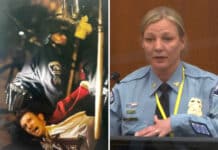(Power Line) — In part 11 of this series yesterday I concluded that juror 116 — the deer hunter — filled out the profile of the optimal juror for Derek Chauvin. The prosecution exercised a peremptory challenge to strike him, as it has the few other prospective jurors who turned up with a neutral view of Chauvin and a mind open to his defenses.
Juror number 127 proved even better for Chauvin than the deer hunter. He was so good that Judge Cahill upheld the prosecution’s challenge to him for cause. He is a former over the road trucker who made a career change at age 50. Having found an apprentice program that served his needs, he now works in construction as a pipefitter.
He is hostile to the media based on their political agendas of one variety or another. He emphasized how “put off” he is by the media “trying to influence him.” He also emphasized his impartiality. “The evidence,” he said, should “stand on itself.”
As I guessed at this point, he is deeply in tune with the reality principle. He would have worried about the threat to his personal safety posed by jury service. Why? “After viewing Lake Street and all that, it’s concerning.” Lake Street is the heavily damaged east-west thoroughfare running through the heart of south Minneapolis that was targeted in the riots and looting following the death of George Floyd last year.
“I don’t want to be afraid to make the right choice,” he added with respect to the verdict he would render. “It’s not about them, it’s about a person’s life right now.”
This was the ideal juror for Chauvin. He respects and appreciates the police. Indeed, on a related point in the juror questionnaire he pungently expressed his hostility to the movement to defund the police as “lunacy.”
I could go on, but let me cut it short. His favorable attitude toward the police and the testimony they would give made him the subject of a challenge for cause by prosecutor Steve Schleicher, the outside attorney contributing his services to Chauvin’s prosecution by the State. Judge Cahill upheld Schleicher’s challenge to him for cause under the Minnesota Supreme Court’s Logan case.
After Judge Cahill excused him for cause, he announced that he had thought about the defense challenge to juror 121 for cause overnight and revisited the Minnesota Court of Appeals decision in the McKinley case cited by defense counsel Eric Nelson on Monday. Based on McKinley Judge Cahill retroactively restored the peremptory challenge Nelson had exercised to strike him and upheld Nelson’s challenge to him for cause. As it turned out, however, Nelson had no occasion to use it.
Juror number 129 is the mother of three. She had concerns about the safety of her family if she were to serve in the case. She was extremely nervous stating her views as a potential juror. Judge Cahill examined her off audio and excused her for cause on his own motion. I inferred that her family responsibilities had something to do with it.
Juror number 130 reverted to a profile closer to the norm in this case. He was active in the protests that followed Floyd’s death. The video and “everything [he] saw” affected him. He conceded that he would probably be lying if said he could be fair and impartial to Chauvin. Judge Cahill also excused him for cause on his own motion.
I thought we would come away with the fifteenth juror that Judge Cahill wanted before noon. We were running up against my imaginary deadline with juror 131. He is an accountant with plans to move out of the state at the end of May. He is interested in sports. I understood him to have a stake in the NCAA men’s basketball tournament.
He is familiar with the facts of the case and the video from news accounts. He has a “somewhat negative” impression of Chauvin and his fellow officers during Floyd’s arrest. He thinks the duration of Floyd’s restraint “may have been unnecessary.” He has a neutral impression of Floyd. I assessed him in my notes at this point as a tough juror for Chauvin.
At work he has discussed what can be done “to end racism.” He wants to do his part. He started by reading a book on the subject — what book? he couldn’t remember — but he didn’t quite finish it. He thinks that blacks are treated unfairly in the criminal justice system.
He holds himself out as an analytical person. He droned on in a monotone that sounded like a parody of an accountant. He stated that he would focus any decision on the evidence produced in court. I have in my notes that I don’t believe him, but I can’t articulate why. Nelson passed him for cause at this point.
I think Schleicher and the State’s jury consultant must also have assessed the accountant as favorable to their case. Schleicher’s initial questions to him asked about the new puppy he and his wife have taken on. Schleicher seemed to be killing time until he passed the juror for cause as well.
Schleicher elicited the juror’s attitude toward athletes taking a knee during the national anthem. He is not crazy about it. He would prefer the expression of their views in a different form but understands their intention.
He is not altogether on board with Black Lives Matter. He doesn’t hold them responsible for the rioting, but thought they may have contributed to it. He strongly disagrees with defunding the police. “They perform a valuable service to society,” he said. As for Blue Lives Matter, “They haven’t done enough to change the conversation” on “equality and gun control.”
As I say, I think Schleicher was killing time. Just before my imaginary noon deadline, Schleicher passed him for cause. He is the fifteenth juror Judge Cahill wanted in case any of the first fourteen don’t show up for opening statements on Monday. The courtroom as reconfigured to meet public health recommendations can only accommodate fourteen jurors.
Court is adjourned until Monday. Here are the final fifteen jurors — the first twelve are regulars, the others alternates — presented by the court:
• No. 2: white male; 20s
• No. 9: multi/mixed-race woman; 20s
• No. 19: white male; 30s
• No. 27: black male; 30s
• No. 44: white woman; 50s
• No. 52: black male; 30s
• No. 55: white woman; 50s
• No. 79: black male; 40s
• No. 85: multi/mixed-race woman; 40s
• No. 89: white woman; 50s
• No. 91: black woman; 60s
• No. 92: white woman; 40s
• No. 96: white woman; 50s
• No. 118: white woman; 20s
• No. 131: white man; 20s
Court TV has compiled a retrospective on the jurors each side has removed through peremptory strikes. The talking heads of CourtTV are in search of a racial angle. The jurors struck by Schleicher on behalf of the State are all white. The jurors struck by Nelson make up a rainbow coalition adverse to Chauvin in one way or another, but I don’t think that’s quite how Court TV put it. I call the ten-minute Court TV video “A toast to those who are gone.”


















